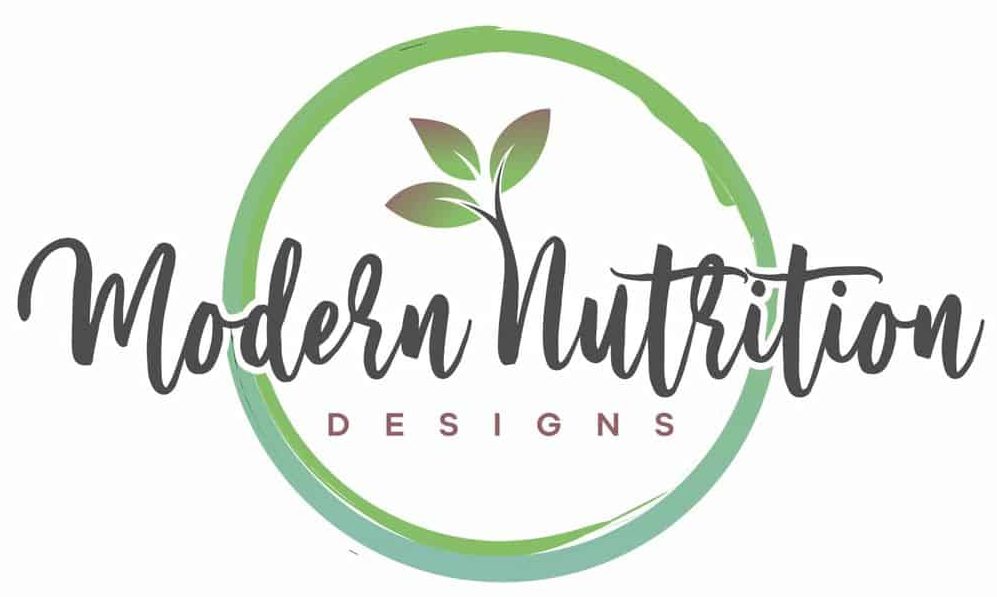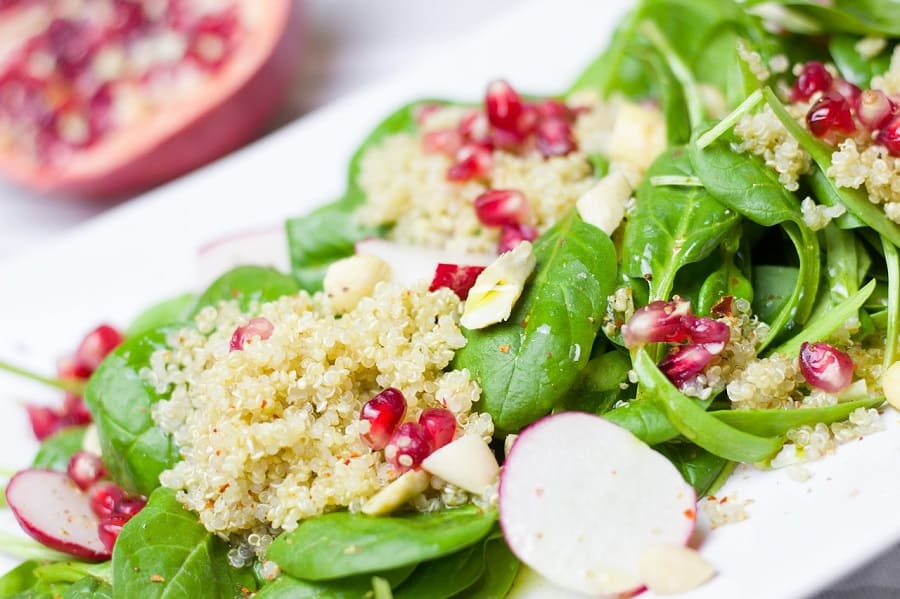Your daily dietary intakes require additional attention and planning during pregnancy, particularly if you are following a vegan diet. I was able to implement a number of helpful nutrition strategies during my recent pregnancy to assist with the nuanced vegan nourishment.
Meeting the increased nutrition requirements during pregnancy is completely obtainable on a healthy vegan diet. Added attention will need to be placed on specific nutrients, such as iron, zinc, B12, and folate to ensure your daily needs are being met. It is important to adapt your diet during this time to include foods rich in these nutrients.
Compiling a library of healthy vegan recipes will greatly ease your ability to maintain these increased nutrient requirements.
Healthy snacks are the best way to keep mommy and baby nourished during gestation because small frequent food intakes are ideal for crowded, queasy tummies. You will find 5 delicious recipes specifically tailored for pregnant vegans in this article.
Increased nutrient requirements during pregnancy
You are literally building a human being. This necessitates a thorough daily nutrition strategy.
While pregnant, it is important to meet additional dietary needs for each of the following nutrients:
- iron
- copper
- iodine
- zinc
- Vitamin A
- riboflavin
- pantothenic acid
- B6
- B12
- Vitamin C
- magnesium
- thiamin
- niacin
- folate
Choline requirements are also increased during pregnancy from 425 mg to 450 mg.
I chose not to include choline in the nutrient analysis that follows each recipe, however, because it is abundant in virtually every food group because it is contained within all cell walls.
By tailoring your meals and snacks to accommodate for the increased nutrient requirements needed during pregnancy you will benefit by reducing your risk of the following:
- birth complications
- low birth weight
- premature birth
- preeclampsia
- gestational diabetes
- miscarriage
- neural tube defects
- unnecessary weight gain
Obtaining adequate nutrition during a vegan pregnancy will also reduce symptoms of morning sickness, pregnancy-brain, food cravings, and uncomfortable mood swings.
Vegan Pregnancy Snacks
The rest of the article will focus on 12 snacks that have been carefully constructed with whole-plant foods that provide a significant source of the nutrients listed above. They are perfectly tailored to meet the additional nutrient requirements for a healthy, vegan pregnancy.
1. Nuts & berry quinoa bowl
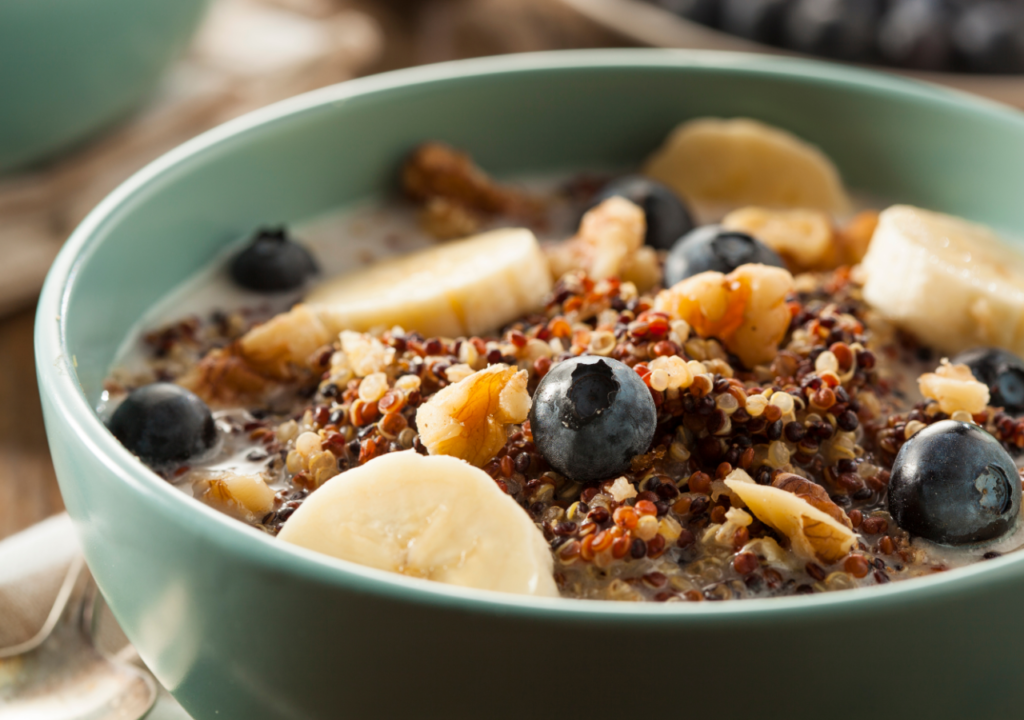
Ingredients
- 3 cups cooked mixed quinoa (1 cup dry)
- 1/2 cup raspberries
- 1/2 cup blackberries
- 1/2 cup blueberries
- 1.5 oz chopped walnuts
- 1.5 oz chopped pecans
- 4 tbsp chia seeds
- 6 tbsp aged dark chocolate balsamic vinegar
Instructions
Cook the quinoa according to package instructions. Allow to cool.
Fold in the berries, pecans, walnuts, and chia seeds. Drizzle the balsamic vinegar on top. Enjoy!
Store in an air-tight container in fridge for up to 4 days.
Makes approximately 6 servings
Total calories: 286; Protein: 7.3 grams; Carbohydrate: 35.6 grams; Fat:13.7 grams; Fiber: 7.6 grams
Nutrients met from recipe
This recipe is not only sweet and tasty but also easily digested, especially when consumed cold. This is helpful during that dreaded first trimester when all your senses are changing and adapting to a new set of DNA setting up shop in your womb.
Quinoa is actually a pseudograin, which means it will provide a greater amount of protein than average grains. Protein is important for numerous reasons in regard to a developing fetus.
Proteins provide essential amino acids for the metabolic changes and adaptations occurring in mom and baby during gestation.
Increased protein demands are particularly prevalent during the third trimester due to the rapid growth that takes place during these months. The NIH recommends obtaining an additional 10grams of protein per day throughout pregnancy.
10 grams of protein can be found in 2 cups of spinach or 1/3 cup of legumes, for instance.
The berries in this recipe contain a significant amount of antioxidants, among other essential nutrients.
Antioxidants help reduce oxidative stress that occurs in our cells tissues throughout our lifespan as a natural byproduct of metabolic processes, but also as a result of exposure to toxins in our environment.
Oxidative stress is implicated in the pathophysiology of many reproductive complications including infertility, miscarriage, pre-eclampsia, fetal growth restriction, and preterm labor.
Pecans and walnuts are also extremely high in antioxidants, as well as healthy fatty acids required by the developing fetus and mommy.
Chia seeds provide a whopping 4 grams of alpha-linolenic acid (ALA) which is readily converted to DHA by the beneficial bugs in your lower digestive tract. That amount is .8 grams higher than the ALA found in ground flax seeds.
By grinding the seeds prior to consumption you are able to increase the bioavailability of the seeds. The grinder will assist in liberating the nutrients contained within the cell walls.
The body’s natural digestive process that acts in this same manner is less efficient.
Here is the full micronutrient breakdown below for the nut & berry quinoa bowl:
| Nutrients | Amount per Serving | %Daily Value |
|---|---|---|
| B1 (Thiamine) | .19 mg | 12.8 % |
| B2 (Riboflavin) | .14 mg | 8 % |
| B3 (Niacin) | 1.14 mg | 5.7 % |
| B5 (Pantothenic acid) | .22 mg | 2.2 % |
| B6 (Pyroxidine) | .28 mg | 13.8 % |
| B12 (Cobalamin) | 0 | 0 |
| Folate | 56.51 mg | 14.1 % |
| Vitamin A | 48.67 mg | 1 % |
| Vitamin C | 6.68 mg | 11.1 % |
| Copper | .47 mg | 7.6 % |
| Iodine | — | — |
| Iron | 3.40 mg | 18.9 % |
| Magnesium | 110.37 mg | 27.6 % |
| Zinc | 1.98 mg | 13.2 % |
The walnuts and chia seeds used in this recipe also provide a significant amount of omega-3 fatty acids that convert to DHA by the friendly bacteria that live in the latter portion of your digestive tract.
DHA is important for proper brain and nerve function in mom and baby.
For a boost of more readily absorbed omega-3 fatty acids grind your seeds before adding them to your quinoa.
2. Greek red cabbage & kale salad
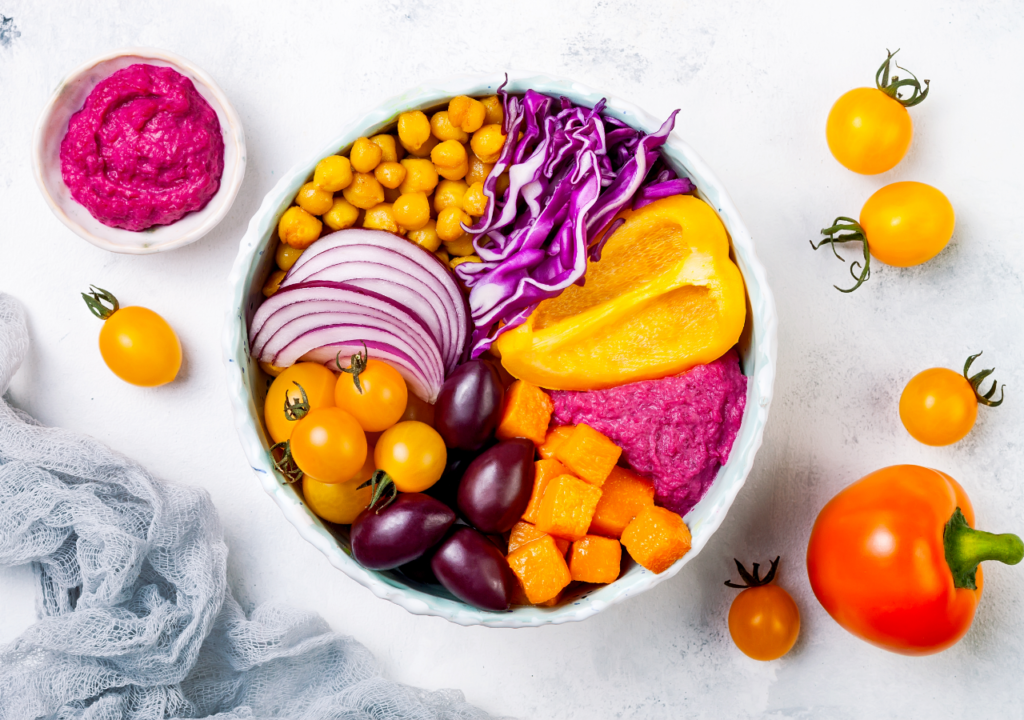
Ingredients
Salad
- 1 small red cabbage
- 1 bunch of kale
- 1 cup broccoli sprouts
- 2 cups spinach
- 1 sheet dried nori
- 75 g (about 25 olives) kalamata olives
- 15 oz chickpeas
- 10 0z cherry tomatoes
- 1 red bell pepper
- 1medium yellow onion
- 2 oz sunflower seeds
- 6 tbsp hemp seeds
Greek Dressing
- 2 tbsp flax seeds
- 1 cup unsweetened plain soy yogurt
- 1/2 cup balsamic vinegar
- 1 tbsp blackstrap molasses
- 1/2 cup lemon juice
- 1/2 cup water
- 2 tbsp spicy brown mustard
Instructions
Chop the cabbage, kale, bell pepper, cherry tomatoes, kalamata olives, and onion. Combine with spinach, broccoli sprouts, chickpeas. Crumble dried nori sheet and sprinkle on top with sunflower and hemp seeds.
Now whisk together mustard, yogurt, molasses, lemon juice, flax seed, water, and balsamic vinegar. Dressing will thicken after about 10 minutes.
Eat as much as your heart desires! This is a very low-calorie, nutritious snack.
Makes approximately 5 servings.
Total calories: 423; Protein: 20 grams; Carbohydrate: 49.3 grams; Fat: 17.8 grams; Fiber: 13.8 grams
Nutrients met from recipe
I realize that salads may be difficult for some mommies-to-be to ingest during their first trimester due to nausea and feelings of overall queasiness.
But I wanted to include this snack because salads were my number one craving during my second and third trimester.
They are also a fast, easy way to get a number of nutrients into your diet during a single sitting.
The chickpeas used in this salad provide a number of rich nutrients required by your developing baby. This legume is packed with iron, folate, vitamin A & C, thiamin, riboflavin, niacin, pantothenic acid, and pyroxidine for your pregnancy needs.
The greens, cabbage, and sprouts are another significant source of the vitamins and minerals needed for your developing fetus. Kale is particularly high in vitamin A & C, and folate. While red cabbage has a high amount of pyroxidine (B6).
Sprouted plant foods increase the amount of nutrition provided by a given whole-food. By sprouting nuts, veggies, seeds, whole grains, and other edible plants you actually increase the bioavailability of the nutrients contained within.
This simply means that our bodies are able to utilize more of the nutrients found within a plant food. Sprouting also dramatically increases phytochemical and lysine content while reducing compounds that inhibit nutrient absorption.
Nori, a sea vegetable typically used to make sushi and other Asian dishes, is included in this recipe to provide a greatly underappreciated mineral — iodine.
Iodine is required by the thyroid to make hormones that regulate metabolism and other important functions.
This mineral is particularly important during pregnancy and infancy because it establishes proper bone and brain development.
I included three types of seeds in this recipe; sunflower, flax, and hemp seeds, due to their high fatty acid content.
These essential fats will convert into DHA inside the colon. DHA will then be utilized by the brain to maintain adequate function, maintenance, and repair.
Here is the full micronutrient breakdown below for Greek cabbage and kale salad:
| Nutrients | Amount per Serving | %Daily Value |
|---|---|---|
| B1 (Thiamine) | .51 mg | 34.3 % |
| B2 (Riboflavin) | .34 mg | 20.1 % |
| B3 (Niacin) | 3.96 mg | 19.8 % |
| B5 (Pantothenic acid) | .77 mg | 7.7 % |
| B6 (Pyroxidine) | .76 mg | 38.2 % |
| B12 (Cobalamin) | .22 mg | 3.7 % |
| Folate | 161.49 mg | 40.4 % |
| Vitamin A | 5027.67 mg | 100.6 % |
| Vitamin C | 130.63 mg | 217.7 % |
| Copper | .80 mg | 39.9 % |
| Iodine | 14.76 mg | 9.8 % |
| Iron | 5.38 mg | 29.9 % |
| Magnesium | 221.25 mg | 55.3 % |
| Zinc | 2.93 mg | 19.5 % |
3. Vanilla chia pudding
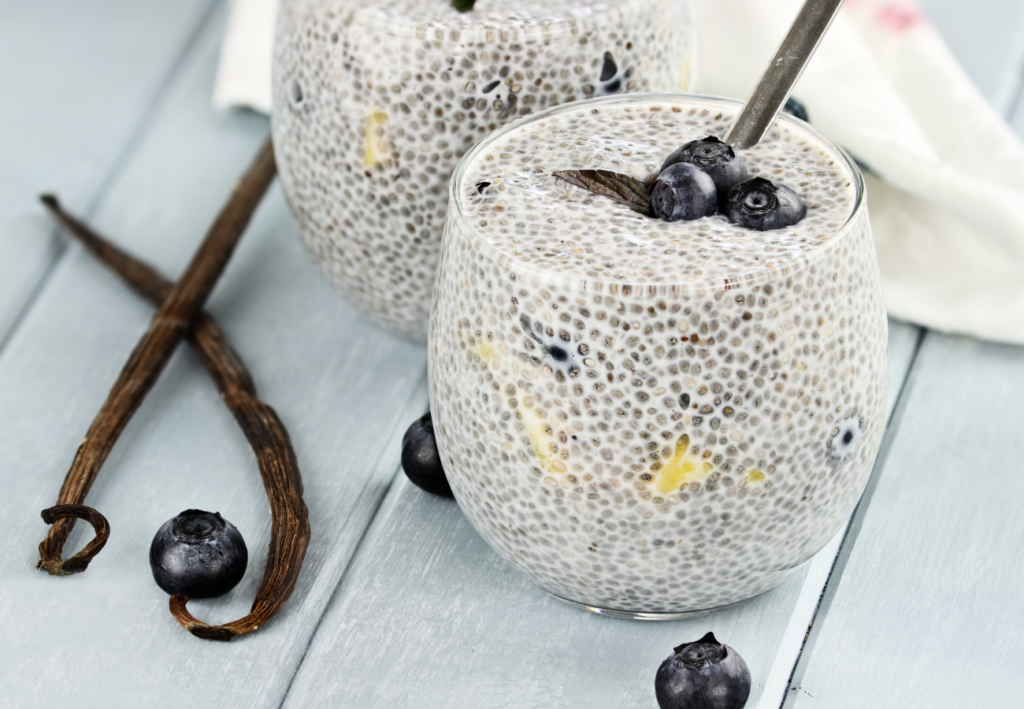
Ingredients
- 1/2 cup of chia seeds (no grinding necessary)
- 1 1/2 cups of unsweetened plain soy milk
- 1 tsp vanilla extract
- 2 tsp maple syrup (optional)
Try these toppings for added nutrients and flavor:
- cacao nibs
- unsweetened coconut flakes
- wild blueberries
- strawberries
- raw slivered almonds
Instructions
I recommend only making four servings at a time since the pudding will only keep for about 5 days. You will also need to prepare this tasty treat at least six hours ahead of time, or leave it sit in the fridge overnight.
Mix together the chia seeds, plant milk, vanilla extract, and maple syrup then let cool in the refrigerator for at least 6 hours.
If you are a chocolate lover you can add cocoa powder prior to refrigerating.
Top each serving with cacao nibs, coconut flakes, blueberries, strawberries, and almonds prior to consumption.
Total calories: 249; Protein: 9.5 grams; Carbohydrate: 23.8 grams; Fat: 15.5 grams; Fiber: 13 grams
Nutrients met from recipe
Chia pudding is a great snack to make throughout your pregnancy, but particularly during the initial trimester. The pudding is easily digestible and will likely not disrupt your tummy.
Cold foods expel less of an odor, thereby making this snack an unlikely trigger for symptoms of morning sickness.
Chia seeds and fruit are also a great source of pyroxidine (B6). Research shows that vitamin B6 helps to alleviate morning sickness. It may also reduce symptoms of depression brought on by hormone fluctuations during pregnancy.
Pyroxidine is also essential for converting amino acids obtained through dietary protein to energy. It also is required for building fatty acids, amino acids, and neurotransmitters. All of which are rapidly occurring during gestation.
Cacao nibs are a highly nutritious chocolate product made from crushed cocoa beans. They’re exceptionally rich in antioxidants that help reduce oxidative stress and inflammation.
This form of chocolate is dairy free and free of sweeteners. Cacao nibs provide a rich flavor to the generally bland taste of pudding. They are especially helpful for keeping your sweet-tooth cravings at bay.
The only disclaimer attached to this chocolaty food is that it contains caffeine. The amount of caffeine, however, is relatively small, especially when consumed in small amounts.
There are 22.4 mg of caffeine in one ounce (a single serving) of cacao nibs, while 8 fluid ounces of coffee contains 95 mg. If you are uncomfortable with including any caffeine in your diet at this point in your pregnancy feel free to leave it out.
The coconut flakes, berries, and almonds will provide plenty of additional sweetness and flavor.
The healthy fatty acids contained within the almonds and coconut flakes will help with the absorption of the fat-soluble vitamins (A, D, E, K) provided by this pudding snack.
These ingredients are also great sources of minerals, such as copper, magnesium, and iron. All of which are required in greater amounts during pregnancy.
Here is the full micronutrient breakdown below for vanilla chia pudding:
| Nutrients | Amount per Serving | %Daily Value |
|---|---|---|
| B1 (Thiamine) | .08 mg | 5.6 % |
| B2 (Riboflavin) | .25 mg | 14.9 % |
| B3 (Niacin) | 1.67 mg | 8.3 % |
| B5 (Pantothenic acid) | .25 mg | 2.5 % |
| B6 (Pyroxidine) | .35 mg | 17.3 % |
| B12 (Cobalamin) | 1.13 mg | 18.8 % |
| Folate | 30.69 mg | 7.7 % |
| Vitamin A | 224.42 mg | 4.5 % |
| Vitamin C | 23.55 mg | 39.3 % |
| Copper | .29 mg | 14.6 % |
| Iodine | — | — |
| Iron | 4.45 mg | 24.7 % |
| Magnesium | 102.33 mg | 25.6 % |
| Zinc | 1.50 mg | 10.0 % |
4. Cranberry nut breakfast bars
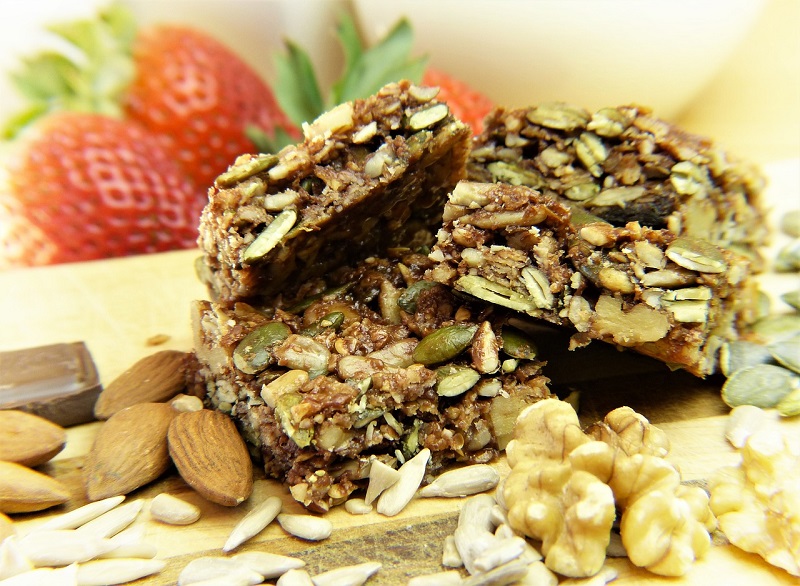
Ingredients
- 2 1/4 cups rolled oats
- 1/2 cup almond flour
- 1/2 tsp baking soda
- 1/2 tsp vanilla
- 5 tbsp unsweetened applesauce
- 1/4 cup blackstrap molasses
- 10 pitted, chopped Medjool dates
- 3 tbsp unsweetened cranberries
- 2 tbsp raw, unsalted sunflower seeds
- 2 tbsp sesame seeds
- 2 tbsp pumpkin seeds
Instructions
Preheat oven to 325. Use an 8 x 8 silicone pan or line with parchment paper.
Combine all ingredients. Be sure to mix evenly.
Press mixture into pan by placing a piece of wax paper on top and compact.
Bake 18 to 22 minutes or until golden brown.
Cool completely before cutting into bars.
Makes 9 servings
Total calories: 388; Protein: 10.1 grams; Carbohydrate: 59.5; Fat: 13 grams; Fiber: 6.7 grams
Nutrients met from recipe
These breakfast bars are sure to satisfy your sweet-tooth, while keeping your morning sickness at bay.
High-carb, low-fat snacks, such as this, pass through the stomach quickly and are easily digested. This ensures less opportunity for feelings of queasiness to develop after eating.
Almond flour is rich in heart-healthy fats and has double the protein and triple the fiber compared to all-purpose flour.
High protein is helpful for mom and her developing fetus since it contains the building blocks essential for growth, repair, and maintenance.
Added fiber is particularly important during pregnancy since increased estrogen levels in the blood tend to induce constipation.
Women also tend to suffer from increased episodes of constipation later in pregnancy due to the growing fetus pressing against their bowels.
Eating foods naturally high in fiber, such as rolled oats, almond flour, and dates will help to alleviate constipation.
Blackstrap molasses is the most nutrient-rich sweetener available not only to vegans but altogether.
Just two tablespoons can provide more calcium than a serving of milk, more iron than an 8-oz steak, more potassium than two large bananas, and more magnesium than 2 servings of quinoa.
Be sure to use organic varieties of this natural sweetener since conventional versions tend to be very pesticide laden.
Sesame seeds are high in fiber, antioxidants, and B vitamins. They also have twice as much protein as flax seeds.
These seeds have been shown to regulate glucose metabolism, stabilize blood pressure, and reduce oxidative stress throughout the body. All highly important health markers during gestation.
Pumpkin seeds are iron champions. They also assist in glucose regulation and the reduction of oxidative stress.
Here is the full micronutrient breakdown below for cranberry nut breakfast bars:
| Nutrients | Amount per Serving | %Daily Value |
|---|---|---|
| B1 (Thiamine) | .15 mg | 9.8 % |
| B2 (Riboflavin) | .11 mg | 6.6 % |
| B3 (Niacin) | 1.12 mg | 5.6 % |
| B5 (Pantothenic acid) | .58 mg | 5.8 % |
| B6 (Pyroxidine) | .19 mg | 9.5 % |
| B12 (Cobalamin) | 0 | 0 |
| Folate | 16.54 mg | 4.1 % |
| Vitamin A | 41.40 mg | .8 % |
| Vitamin C | .67 mg | 1.1 % |
| Copper | .51 mg | 25.6 % |
| Iodine | — | — |
| Iron | 2.43 mg | 13.5 % |
| Magnesium | 122.52 mg | 30.6 % |
| Zinc | 1.49 mg | 9.9 % |
5. Peanut butter pumpkin smoothies
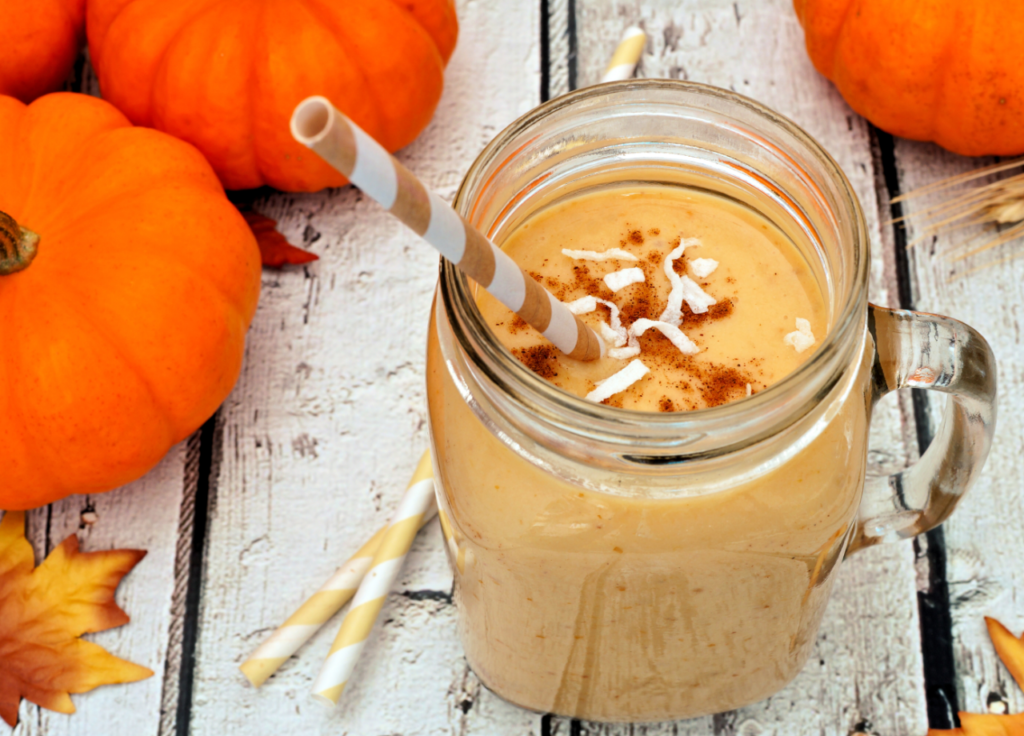
Ingredients
- 3 tbsp natural peanut butter
- 15 oz. can pumpkin puree
- 1 cup unsweetened soy milk
- 6 soaked, pitted Medjool dates
- 1 tbsp maple syrup
- 2 frozen bananas
- 2 cups spinach
- 2 tbsp ground flax seeds
- 1 tbsp pumpkin pie spice
- 2 tsp cinnamon
Instructions
Soak dates for at least 30 minutes in the unsweetened soy milk.
Blend soaked dates and soy milk in a high powered blender for 2-3 minutes. Then add the spinach and blend for another minute or two.
Mix in the spices, seeds, peanut butter, maple syrup, and frozen bananas and blend until creamy. Finally, add the pumpkin puree one third at a time and blend until evenly mixed.
Serve immediately or cool in fridge for up to 24 hours.
Ninja tip: Keep the can of puree in the fridge over night prior to use. Add ice cubes if necessary for chilling purposes.
Makes 3 servings.
Total calories: 292; Protein: 8.6 grams; Carbohydrate: 50.3 grams; Fat: 8 grams; Fiber: 9.5 grams
Nutrients met from recipe
Soy is a very beneficial source of nutrients during pregnancy. It provides a moderate amount of protein, folate, iron, calcium, zinc, and trace minerals.
It also contains phytoestrogens that may help to regulate the extreme fluctuations of estrogen that occurs throughout gestation.
Be sure to use natural soy milk that contains zero added sugars, preservatives, and other harmful additives.
Peanut butter provides the natural, healthy monosaturated fat that helps you feel satisfied and full. Nut butters are hIgh in protein as well.
Although peanuts are actually a legume, they are a great source of vitamin E, vitamin B3, vitamin B6, folate, magnesium, copper and manganese.
Try to find a peanut butter that contains simply nuts. As most conventional peanut butters contain high amounts of hydrogenated vegetable oils, salt and refined sugar.
Pumpkin is an underutilized winter squash. It is rich in vitamin A and C, potassium, iron, copper, manganese, potassium, and riboflavin.
Pumpkin also contains 3 grams of fiber per serving and is low in calories at a mere 49 calories per cup.
Pumpkin pie spice typically contains cinnamon, nutmeg, ginger, and cloves. Each of these spices provides impressive health benefits for you and your developing baby.
Cinnamon contains large amounts of highly potent polyphenol antioxidants. It also improves insulin sensitivity to reduce your risk of gestational diabetes.
Nutmeg and ginger aid in relieving indigestion. Ginger, in particular, has been used historically to reduce symptoms of morning sickness.
Cloves have antimicrobial properties which help protect against infection. They are also rich in antioxidants which may keep your oxidizing free radicals at bay.
Here is the full micronutrient breakdown below for peanut butter pumpkin smoothies:
| Nutrients | Amount per Serving | %Daily Value |
|---|---|---|
| B1 (Thiamine) | .05 mg | 3.2 % |
| B2 (Riboflavin) | .20 mg | 11.8 % |
| B3 (Niacin) | .59 mg | 3.0 % |
| B5 (Pantothenic acid) | .23 mg | 2.3 % |
| B6 (Pyroxidine) | .28 mg | 13.9 % |
| B12 (Cobalamin) | .75 mg | 12.5 % |
| Folate | 47.45 mg | 11.9 % |
| Vitamin A | 10292.44 IU | 205.8 % |
| Vitamin C | 12 mg | 20.0 % |
| Copper | .12 mg | 6.0 % |
| Iodine | — | — |
| Iron | 2.58 mg | 14.3 % |
| Magnesium | 40.46 mg | 10.1 % |
| Zinc | .38 mg | 2.5 % |
When to consider supplementation
Many doctors prescribe multivitamins to pregnant or nursing mothers to ensure adequate dietary nutrition.
This can be problematic since synthetic versions of nutrients, such as vitamins and minerals do not respond the same way inside the body as do nutrients obtained by whole natural foods.
It is important to obtain as much of your nutrition from whole plant foods as possible. Synthetic multi-vitamins should be used with caution, as large quantities of these substances can cause myriad problems inside the body.
For instance, when we obtain folate from green, beans, and oranges we reap all the wonderful health benefits obtained from those foods, while also acquiring our daily recommended dose of folate.
On the other hand, when folate is obtained by the use of a multi-vitamin in the form of folic acid you miss out on all the added benefits acquired from the plant food, while also increasing your risk for breast and colorectal cancer and your baby’s risk for autism.
The compounds found in whole natural foods work synergistically with our body to promote health. But synthetic versions of these substances may come with a number of unwanted side-effects.
Whenever possible, you should be obtaining your nutrients from whole food sources to provide the best health benefits for you and your developing fetus.
Supplement recommendations
The only nutrients vegans cannot obtain regularly from a whole-foods diet are vitamin B12 and vitamin D. In some instances iodine supplementation may also be necessary due to the reduction of iodine in most modern cultivated soils.
Vitamin B12 is made by microorganisms that live in the soil. Today’s sanitation practices have significantly depleted this resource, however. Both vegans and non-vegans are advised to consume a weekly B12 supplement of up to 1000 mcg.
For pregnant vegans, it is recommended to take 1,000 mcg of B12 two to three times per week.
Vitamin D is an ongoing concern for those who work indoors or live relatively far from the equator where the sunlight is less direct. Vegans, pregnant vegans, and non-vegans alike are wise to take 15 mcg (600 IU) of vitamin D supplementation daily.
For more on vegan dietary supplementation, I have dedicated an entire article on this topic titled 4 Supplements You Actually Need on a Plant-based Diet.
I also provide more in-depth information on carrying out a healthy vegan pregnancy in my earlier article titled Plant-based Pregnancy: Insider How-tos, Benefits, & Myths.
